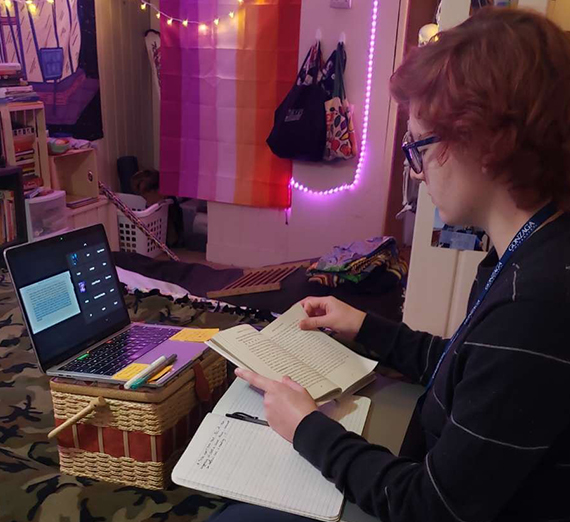Getting Classroom Experience ... Without the Classroom

What does student teaching look like without the classroom?
This is the question that Gonzaga University School of Education faculty, professors and students have had to answer. COVID-19 health concerns have prompted most Spokane public schools to transition to virtual learning. For many students in the School of Education, this means their field experiences and student teaching take place online.
The details were months in the making. Before summer began, the School of Education assembled a task force to brainstorm different options for countless scenarios.
This is the question that Gonzaga University School of Education faculty, professors and students have had to answer. COVID-19 health concerns have prompted most Spokane public schools to transition to virtual learning. For many students in the School of Education, this means their field experiences and student teaching take place online.
The details were months in the making. Before summer began, the School of Education assembled a task force to brainstorm different options for countless scenarios.
Dean Yolanda Gallardo said, “It was clear that it wouldn’t be business as usual.”
The team created a virtual module that taught faculty and student teachers about virtual learning strategies, technology tools, online safety and building relationships online. The harsh reality in August required preparing for instruction landscapes that could be completely virtual, solely in-person, hybrid and a combination allowing for flexibility to shift at any point among these styles.
The Gonzaga School of Education maintained two priorities. The first was the safety of Gonzaga students and the greater Spokane community.
The second was the success and well-being of the elementary, middle and high school students the School of Education serves.
Kathy Nitta, assistant professor of teacher education, said student teaching is “an opportunity to expand teaching skills.” It’s also necessary for student teachers to be value added to a classroom, and to support K-12 students and families, she added.
“I’m so proud of Gonzaga University and our community partners. Everyone’s hearts are all in the right place,” Gallardo said.
Gonzaga’s education majors in field experiences are realistic but hopeful.
Emily Johnson (’21), who is majoring in Psychology and completing her teaching certification, taught math virtually at Cooper Elementary in Spokane. Over the course of the semester, she spent 30 hours student teaching, before student teaching full-time this spring.
Teaching math online to elementary schoolers has its difficulties. “The kids are great,” Johnson said, “while some do get more distracted than others.”
Lizzie Vosler (‘21) taught eighth grade english at Spokane International Academy. Like other students placed in field experiences, she split her time between student teaching and taking classes to fulfill her degree requirements at Gonzaga.
Though not a fan of online learning in general, Vosler enjoys connecting with her students.
“They’re fun, they bring a different kind of energy to the classroom,” she said. “One time we even stayed after class just to talk about Star Wars.”
Vosler plans on taking a gap year after graduation citing the high rate of burnout for teachers, worsened by the challenges of online learning.
Madilynn Gamaunt (’21) also completed her field experience virtually in the fall. She taught a kindergarten class at Adams Elementary, in Spokane Valley. Her students elected to be online throughout the year.
A younger age group brings new challenges when it comes to virtual learning. Gamaunt says they tried to provide breaks for the students every 25 minutes.
“The stamina isn’t there,” Gamaunt said, “and learning new technology can be extremely frustrating for my kids, especially when they can’t express it.”
“We take it day by day,” Gamaunt added.
Another complication for student teachers is the edTPA assessment required for the teaching certificate. It requires candidates to record a video of their teaching accompanied by an analysis. However, privacy concerns forbid the video from containing footage or names of the students. Student teachers will have to be creative to maintain privacy while still showcasing student responses.
Despite these hurdles, Johnson focuses on the positive. “Kids are getting more access to technology education,” she said.
The anxieties related to COVID-19 also allow for increased social and emotional learning. Gamaunt says that it’s an opportunity to teach kids to identify feelings, how to act and how to treat others.
Neither Johnson, Vosler nor Gamaunt are letting the situation bring them down.
“We’re going into a field where you have to be flexible and adaptive,” Gamaunt said, “we’ll be better equipped for the future.”
